The sooner the CAP is abolished the better, with part of
the huge sums saved redeployed to retrain farmers to learn new, marketable
skills that customers actually value.
There is no shortage of food in the world for those able
to pay for it, which certainly includes the countries of the European Union.
No-one really challenged what I said. The farmers
were too busy squabbling among themselves about how to divvy out the CAP
spoils.
That tends to make another point. The prime crop in
EU farming today is not farm produce but farm subsidies
- how to maximise them and get the biggest share, which is always the case
when big money is being given away. Subsidies are like narcotics -
destructive and degrading in equal manner; recipients quickly become junkies
who lose their sense of pride and those who distribute them the drug
dealers.
Even in this lively TV discussion about farming, so
pervasive was the narcotic that not a single person talked about actual
farming, only the subsidies.
Imagine if that energy went into actual, you know,
farming.

Back to List of Contents
|
|
|
Quote (19th March): “OK, so props don't ever join the referee ranks
because it's a lot of running. But would it be so harmful to perhaps get a
prop on the pitch to officiate at scrum-time only? He could then leave the
field until the next scrum. He wouldn't have to run anywhere, he'd get free
pies on the touchline, and we'd have a scrum official who'd really know what
was going on.”
A commentator's suggestion at the recent
Wales/England 6-Nations championship decider
(won 30-3 by Wales), which was heavily punctuated by inscrutable penalties
at scrum time.
The problem is that rugby referees are never props (who hate running)
and therefore never understand the mysterious, nefarious machinations
grinding within the dark recesses of a heaving, wheezing, sweat-laden scrum.
Hat-tip: Graham Hunt in Perth, Oz
Quote (19th March): “Sure what could go wrong?
It is the day after St Patrick’s Day, a roomful of Paddies, a free bar and
the future king of England. It’s going to be messy.”
Comedian Patrick Nulty at a €1,000-per-plate
testimonial dinner
in London for Irish rugby star Brian O'Driscoll,
attended by, inter alia, the Duke of Cambridge |
|
|
Suicide Treblethink in Ireland
- 7th March 2013
From compassion
to blood sacrifice
George
Orwell, in
“Nineteen
Eighty-Four”,
his seminal though subtle diatribe against global tyranny, introduced the
world to many new words that have since entered the English language:
 Big
Brother, thoughtcrime, newspeak, memory hole, duckspeak, unperson ...
doublethink. Big
Brother, thoughtcrime, newspeak, memory hole, duckspeak, unperson ...
doublethink.
He defines doublethink as, among other things,
“the power of holding two contradictory beliefs in
one's mind simultaneously, and accepting both of them”.
He even has a shorthand word for this - blackwhite,
denying the evidence of your eyes by declaring and believing
that black is white or vice versa.
I wonder how many other Western countries are as
conflicted about suicide as Ireland, which seems to have developed not
Orwell's doublethink but its own treblethink on this troubling subject.
Judging by Irish media over the past few weeks and months,
huge numbers of Irish, in full sanctimonious flow, seem to believe that
death by suicide is, simultaneously,
-
a terrible
thing that must be prevented by all means,
-
a wonderful
thing that must be accommodated by all means,
-
a dreadful
worry that can be alleviated only by blood sacrifice.
Examples:
1 A Terrible
Thing
It is a terrible thing to lose a loved one who has died at
his/her own hand.
Yet death by suicide in Ireland has become so prevalent
that Ireland's main opposition party, Fianna Fail, is
proposing a new 7½% tax be levied on alcohol sales (excluding pubs and
restaurants) in order to fund €86 million worth of suicide prevention
services. Its report,
“Actions
Speak Louder than Words: A Structural Approach to a Societal Issue”,
advises that Irish suicides have increased by 30% over the past decade, a
huge heartbreaking tragedy that took 525 lives in 2011, most of them young
males.
This death toll is almost thrice that of the roads (186),
another major killer of predominantly young males, but one that receives far
more attention and funding than suicide, and has positive results to show
for it in terms of reducing the deaths. Fianna Fail's attempt to
tackle suicide is an honourable one which if adopted will undoubtedly
likewise make a
real difference.
Those considering suicide do indeed need to be identified,
helped, counselled to support them in dealing with these self-destructive
thoughts. Prisoners who present a self-harm risk are routinely put on
suicide watch, which includes regularly checking of their cells as well as
removing all items that might be used to cut, strangle or poison.
Suicide is permanent, life's problems are temporal.
No effort is too great to save such people from needlessly extinguishing their most
valuable attribute - their lives - when actual solutions can be developed.
2 A Wonderful
Thing
 We
have probably all imagined ourselves in some dreadful situation where we
might long for the sweet release of death. We
have probably all imagined ourselves in some dreadful situation where we
might long for the sweet release of death.
Locked-in Syndrome holds
particular terror - who can forget
“The
Diving Bell and the Butterfly”
by French journalist Jean-Dominique Bauby who ended up this way after a
stroke in 1995. Though fully cosmos mentis with all his senses intact, he
awoke unable to move his body apart from his left eyelid, which he used, one
blink at a time, for rudimentary communication to laboriously write his book,
letter by letter. Had
he wanted to commit suicide, he would of course have been unable to do so,
other than to request someone else to end his life.
But that someone else would then have been prosecuted for
unlawful killing or worse, for while the law permits suicide, helping
someone to commit suicide is illegal.
For Irishwoman
Marie Fleming and many others in her sad situation, it's not locked-in
syndrome but terminal multiple sclerosis which since 1986 has been slowly
paralysing her bodily functions and will eventually suffocate her. So
she would like to be the mistress of her own destiny and die at a time of
her choosing, before her suffering and fear become unbearable. But
though in full possession of her mental capacities, she is already confined
to a wheelchair and so to kill herself would need someone to set a system
up, such as a poisonous drink. Once again, that person - in this case
her loving partner - would be liable for prosecution.
There is much sympathy for her predicament, for who would
not want to help a suffering yet coherent relative who desperately wanted to
go to a better place. But the ban on assisted suicide is there for a
reason - to affirm the sanctity of human life but also to avoid creating
situations where vulnerable people feel obliged (or maybe are encouraged) to
have themselves killed, perhaps to relieve kinfolk of a burden or to release
a legacy.
Marie Fleming and many like her would consider it a
wonderful thing to be allowed to commit suicide, with help if necessary, as
a way to conclude her journey on this earth in a dignified and gentle
manner. And public opinion is firmly with them.
But though the law is not with them, judges are hinting to
public prosecutors that they should use discretion in bringing prosecutions
in such cases; ie don't.
3 Dreadful Worry
The third angle to suicide relates to unwanted
pregnancies. In most of the western world, abortion is available more
or less on demand, despite the fact that it is usually against the law.
For example in England, abortion up to 28 weeks was
legalised in
The Abortion Act of 1967, even though the
1861 Offences Against
the Person Act remained in place, rendering abortion illegal under pain of
life imprisonment.
The two Acts were reconciled by saying that abortion is
permissible only if the life or health of the mother is at risk, including
the risk of suicide.
The suicide provision has been the single biggest factor
that has led to abortion-on-demand even up to birth itself - currently
200,000
abortions a year in England and Wales being 20% of all pregnancies. Lord
David Steel, the author of the 1967 Act, is today horrified at the
floodgates he never realised he was opening and
urges Ireland not to follow his much regretted example.
Though no-one can objectively prove that someone will
commit suicide, it is sufficient in UK law for two psychiatrists to vouch
that without abortion a woman is suicidal. This is a massive loophole,
as all it takes is to find a group of pro-abortion psychiatrists to sign the
paperwork and the path is clear.
Indeed, there is no scientific or empirical evidence that
abortion prevents suicide. For example, a recent review of all
maternal deaths in Ireland's main maternity hospitals from 1950 to 2011
has found not a single case of a woman taking her own life because she
was pregnant.
Nevertheless, advocates for abortion argue that it is a great mercy for
a woman to be allowed to abort her baby if it means she avoids suicide
brought on by dreadful worry over her unwanted pregnancy. Such people,
however, never argue that suicidal tendencies should be given the same help,
counselling and if necessary suicide-watch that is accepted practice for
others - even lowly imprisoned criminals - who seem at risk of self-destruction.
Only for pregnant women is suicide to be averted through
infant blood sacrifice.
In Ireland where the 1861 Act also remains in force (as a relic
of British rule), there is a huge push to legalise abortion in case of
threat of suicide, as in England.
But other than concern over the mother's possible suicide,
is there an unthinkable alternative reason for this drive?
Surely it cannot be that risk of suicide is merely a Trojan horse designed
to introduce a regime of
abortion-on-demand? Even though this is precisely what has ensued in England and all other abortion-friendly jurisdictions
where grounds for abortion include suicide, or even mental health.
Treblethink
So there you have it. Thousands of otherwise
rational, well-meaning people indulge in suicide treblethink -
“the power of holding
three contradictory beliefs in
one's mind simultaneously, and accepting all three of them”.
The Good, The Bad and the Ugly Excuse.
What would George Orwell have written? Would
treblethink have entered his vocabulary?

Back to List of
Contents |
|
|
Quote (19th Feb): “Ah
no, I'll let someone else eat him. I know him too well!”
Paddy Jack, in Dublin's Temple Bar
Farmers' Market,
where he serves horse steak sandwiches in Ireland's only horse meat outlet.
He his referring to Do
or Die, his pet racehorse
who is being trained to compete.
But if on the racecourse
Do or Die fails to Do the business he will Die
- and be served up on Mr Jack's stall.
Though for sentimental reasons not to Mr Jack himself.
Quote (12th Feb): “Nothing
I’m proposing tonight should increase our deficit by a single dime.”
President Obama explains in his 2013 State
of the Union address
that his proposed litany of more spending, new programs and new
bureaucracies
will not increase America's $16½ trillion deficit
“by a single dime”!
Yes, really!
Back to List of
Contents |
|
|
Spot the Odd One Out
-14 February 2013
The odd one out is of course the one in the red hat and
the dress, that is to say the lady.
Because she is the oldest of the four.
She is also the only one who in recent months has not
decided to voluntarily resign ahead of time in favour of a successor.
The reason is obvious. She still does not trust
her heir, a spring chicken of a mere 64, to take over her job and
execute her/his duties effectively. So unlike the other three, she is
sticking to her original vow, to serve until death, or in the case of
Archbishop Williams until statutory retirement age.
 | Rowan Williams, the 104th
Archbishop of Canterbury retired on 31st December 2012, at
age 61, nine years earlier than he needed to, and was
replaced by Justin Welby. |
|
 | Pope Benedict XVI, aged 85, will retire on 28th February triggering
a Papal Conclave of cardinals to elect a successor. |
|
 | Queen Beatrix of the Netherlands, 75, will retire on 30th April in
favour of her eldest son Willem-Alexander, who will become the
Netherlands' first male monarch since 1890. |
|
 | 86-year-old Queen Elizabeth II
won't step down at all, so leaving 64-year-old Prince
Charles (barring a not entirely implausible
regicide-matricide) to dangle on for time indeterminate. |
|


Back to List of
Contents
|
|
|
Quote (7th Feb): “My concrete
question to the Irish presidency is: what are you doing to tackle the
problem of growing Christian persecution?”
Dutch MEP Peter van Dalen,
in response to the reported persecution of
a hundred 100 million Christians around the world,
demands that Ireland as current EU “president”,
take concrete action.
Ireland's response? Waffle, of course
Back to List of
Contents |
|
|
World
Will Frac -
6th February 2013
A technological
revolution in hydraulic fracturing (“fraccing”)
of hydrocarbon-bearing shales
is leading to an unstoppable energy revolution, which will in turn
lead to entirely benign revolutions in global economics and geopolitics
A year ago, I wrote in some detail
a post called
“Truth
About Fraccing”
(http://tiny.cc/fraccing) which | |
 |
takes
away much of the mystery surrounding this essentially simple but not
widely understood technique to squeeze more hydrocarbons out of the
ground, and |
 |
demonstrates that the main objections are mainly bogus.
|
|
Just to recap, fraccing (hydraulic
fracturing) entails pumping water down a well and into reservoir rock
that contains hydrocarbons (gas and/or oil) at such a high pressure that
the rock splits open. This exposes much more of the rock to the
wellbore and thus makes it easier for the hydrocarbons to flow into it
and up to the surface.

This post explores what fraccing is
going to mean for the world at large - how it will affect in an almost
wholly benign fashion both global economics and geopolitics.
Just as fraccing is unleashing
undreamed-of volumes of hydrocarbons, so the consistently high oil price
in recent years, firmly in the hundred-dollar-a-barrel category, is
unleashing undreamed-of fraccing technology. (Click on the
interesting oil-price chart below for better detail.)

This unleashed technology has three legs that together
are yielding results that are truly startling:
 |
Seismic surveys are the means by which
subterranean rock shapes and make-up are detected, thereby pinning
down where potential hydrocarbon accumulations might lie.
Recent advances have enabled ever more obscure or small
accumulations to be identified. |
 |
Drilling wells is the means why which these
accumulations of hydrocarbons are connected to the surface. It
too has benefited from ever more sophisticated techniques, from the
major (drilling holes that are directional, horizontal,
multilateral) to the less glamorous such as improved drilling
fluids, measurement techniques, drilling bits, operating practices.
|
 |
Fraccing itself is the process by which the
hydrocarbons can be better liberated from the accumulations into the
wellbore, particularly when the reservoir rock that holds them is
low in both porosity and permeability. Fraccing methods have
improved enormously in recent years, resulting in the production -
and potential production - of vast additional volumes that
previously were thought impossible to bring to surface.
|
Then there is increasing unease, if not panic, in the
West at how
-
1 its consumption has steadily exceeded its
ability to find new hydrocarbons, allied with ...
-
-
2 the extent to which it has therefore become increasingly dependent on
foreign sources for its insatiable thirst for oil and gas, sources which are
largely hostile to the interests of the West, which is in effect
nevertheless funding them.
This chart of America's trillion-dollar dependency
illustrates the point; it is typical of the West in general.
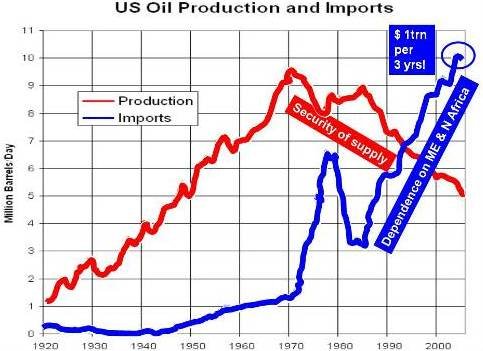
These three elements - oil price, technological
advances and foreign dependency - are the factors that have led to a
fraccing boom, currently evident only in a few parts of the US, but one
that is going to sweep the world.
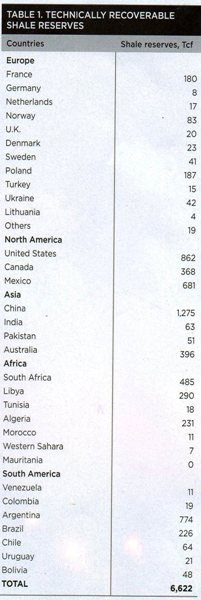 That
is because fraccing is, simply, making available huge
quantities of hydrocarbons within the Western countries themselves,
changing the energy picture dramatically.
That
is because fraccing is, simply, making available huge
quantities of hydrocarbons within the Western countries themselves,
changing the energy picture dramatically.
This tabulation, which appeared in World Oil magazine last
August, uses
data published by the
Energy Information
Administration, a US Federal body which collates and analysises
energy information.
It shows for a large array of countries the estimated
reserves of gas recoverable mainly through fraccing, which add up to
6,622 trillion cubic feet (TCF), a truly astounding figure. One
TCF is the equivalent in energy terms of about 170 million barrels of
oil; thus 6,622 TCF equates to over a trillion barrels,
worth some $100 trillion at today's prices.
These numbers need to be put into context.
First Oil:
BP tells us that the world's oil reserves are currently 1,653
billion barrels, which is sufficient to keep us going for another 54
years.
However, of this 1,196 bn bbl lie beneath the
countries of OPEC, while 859 of them ( 52%) are in the Middle East
and North Africa, which I will refer to as MENAf. (OPEC's oil
income in 2012 alone was a very juicy
trillion dollars.)
Then Gas:
The world's gas reserves amount to 7,361 TCF (BP's
figure again), which is 64 years' worth.
Of this, 3,156 TCF, or 42%, are within MENAf
Oil Plus Gas:
Combined into barrels-of-oil-equivalent (BOE), global
reserves are therefore 2.9 trillion BOE, good for half a century or so,
of which roughly half comes from MENAf.
MENAf is of course the location of oil-rich states such
as Saudi Arabia, Iran, Libya, which have been
 |
fomenting Islamic
hostility against the West for decades, |
 |
lavishly funding hate-filled
mosques and madrassas that preach rabid anti-infidelism and
anti-Semitism to adults and children alike, |
 |
undermining Western
democracies, |
 |
sponsoring Jihadist terrorism and terrorists everywhere.
|
They seek overtly or covertly the conversion of the infidel world to an
Islamic caliphate, under the Koranic injunction to convert, enslave or
kill (eg 9:5).
MENAf countries can behave this way because they are so
wealthy, thanks to the West's inability to keep up with its thirst for
hydrocarbons. Thus the West is funding its own enemies, and by the
way providing most of the technology and expertise to extract the
MENAf's oil and gas.
Thus the trillion BOE that the EIA estimate is yet to be
liberated (through fraccing) from shale gas reserves represents an
addition of some 38% to global reserves.
That is a massive increase by any reckoning, but its
impact is even greater because scan the tabulation above and you can
see that huge volumes are going to come from consuming countries
themselves in Europe, N America and elsewhere.
But that is not still not the full story.

This EIA chart shows in
dark red where the
expected shale gas reserves are to be found. Just as interesting,
however, are the
areas that are left out of the reckoning. These are principally the already
hydrocarbon-prolific regions of Russia, the Middle East, Malaysia,
Indonesia, not to mention the world's entire offshore acreage. Oh,
and the OIL that fraccing will liberate from shales is not
mentioned at all.
So even if the EIA's estimates of shale gas are wrong by
factors, it still looks inevitable that the global stock of oil and gas
is set to increase dramatically.
But what exactly does this mean?
Firstly, the volumes to be released through fraccing -
and therefore the associated revenues - are so vast that fraccing itself
will become an inexorable force. Frankly, money talks, and no
amount of lobbying, bogus scare-tactics or political sanctimony is going
to stop the fraccing.
In due course, the fraccing issue will morph into how
to set standards and rigorously enforce them, a far more constructive
(and indeed necessary) approach than blindly banning the technology.
As shale gas availability spreads globally, gas prices
will tumble. Fraccing has already trigged this in the USA.
 |
In June 2008 the price of natural gas was 12.69 per mBTU
(million British Thermal Units); |
 |
by April 2012
this had
crashed by over 80% to just $1.82.
|

Dramatically lower gas prices will encourage industry
and individuals to adopt it in place of dirtier fuels - notably coal,
wood, turf, oil - and to seek innovative ways to use it. Only last
year the world's first major
gas-to-liquids plant was commissioned, in tiny but gas-abundant Qatar.
Called Pearl, it converts gas into fuels similar to petrol,
diesel or kerosene, suitable even for
commercial airliners.
It will, moreover, be only a matter of time before
abundant gas drives down the cost of all competitor energies. This
process will probably not excessively favour the corporations that
extract and market energy, whose increased volumes will be offset by
lower unit prices - for example, Shell is already
hurting in the US. But conversely, it is likely to be a bonanza for energy-intensive
industries, such as the manufacture of steel, aluminium, cement, glass,
and of course transportation.
Above all, however since every one of us relies on
energy for practically everything, the coming price-drop is going to
amount to a massive global, across-the-board stimulus. But a
stimulus without debt - that doesn't need to be repaid by
future generations.
Surely this must amount to the only viable solution on
the horizon to the global economic crisis that is engulfing the globe,
seemingly with no end in sight.
Moreover, since so much of the new, fracced energy is
going to come from within consumer and other West-friendly countries,
the West's huge and precarious dependence on MENAf is going to reduce
fulgurantly - as well as reducing transportation costs.
In turn, MENAf oil revenues (by far those
countries' principle
source of income) will be slashed as they lose not only export volumes
but also in unit prices. This will much reduce their ability to cause
trouble and sponsor Jihad. It will cause them to focus at last on
the on non-oil, regular part of their economy, in a manner that can only
benefit their populations - and the rest of the world.
In summary, fraccing is triggering an energy revolution
whose effects will be almost wholy benign, for individuals, industries,
countries, global economics and geopolitics.
And yet an awful lot of people oppose it
fanatically; but that is no mystery.
They remain in the dark over what fraccing actually entails, its opportunities -
and yes - risks, because the industry does so little to explain itself.
It is therefore entirely reasonable for ordinary citizens to adopt the
precautionary maxim that
“if you don't know, say no”, when they are operating in a void.
Moreover it is into that very void that activist objectors
eagerly leap, with a far more articulate message than the industry's .
The answer therefore is for the industry to go out and
get its own message across with similar skill and enthusiasm as its
opponents. In other words to evangelise.
This and previous posts, along with associated lectures
I have given, are my own modest attempt to address this. If you
would like me to speak about fraccing at meetings (no charge), just drop
me a line at blog2-at-tallrite-dot-com.
I repeat. Modern fraccing represents an
entirely benign revolution that all humanity should embrace.

Back to List of Contents
|
Policing Gay Boudoirs
- 6th February 2013
Confusion about
who must and who must not
indulge in gay sex in the brave new world of gay marriage
Same-sex
partnerships/unions/marriages throw up new problems that make such
“institutions” increasingly ridiculous, because of the necessity
that gay-sex be performed - or not.
Same-sex civil partnerships, with
all the associated tax-breaks, are available to couples (though for some
reason not threes or fours) if and only if they actually practice their
gay sex; there is no room for celibacy.
 This
can be the only explanation why such
partnerships are not open to couples who eschew sex, such as the
Burden sisters, two elderly spinsters who share their family home
jointly inherited from their parents. When one of the ladies dies,
the death duties the other must pay will force her to sell the house and
move out. Were they bound within a civil partnership, the
surviving sister would simply inherit, tax-free, her
“partner's” half. But such a partnership - and the
associated fiscal advantages - are not open to them because no gay-sex
is involved. Likewise, why shouldn't a pair of (celibate) bridge
partners or a man and his sons be eligible for the civil-partnership tax
breaks? But they're not. No sex, no tax breaks. This
can be the only explanation why such
partnerships are not open to couples who eschew sex, such as the
Burden sisters, two elderly spinsters who share their family home
jointly inherited from their parents. When one of the ladies dies,
the death duties the other must pay will force her to sell the house and
move out. Were they bound within a civil partnership, the
surviving sister would simply inherit, tax-free, her
“partner's” half. But such a partnership - and the
associated fiscal advantages - are not open to them because no gay-sex
is involved. Likewise, why shouldn't a pair of (celibate) bridge
partners or a man and his sons be eligible for the civil-partnership tax
breaks? But they're not. No sex, no tax breaks.
What about equality? And surely we all are supposed to have human
rights?
Well, no we don't.
Unless my buddy and I are prepared for some gay gymnastics in the
boudoir (or maybe on the kitchen table) we're not going to get the
breaks created for single-sex couples in a civil partnership.
Unless ... and here is where it
gets (even more) weird.
The Church of England have been
wrestling for decades with what to do about its gay clergy. It
eventually - grudgingly, gradually over many years - accepted that they
existed, that many of them were in gay relationships and some in civil
unions. But, goaded by its conservative wing mainly in Africa, the
Church drew the line at elevating gay priests to bishophood.
It was convulsed, therefore, when
its American wing, the
Protestant Episcopal Church, decided to break this taboo and promote
Gene Robinson in 2004 to become Bishop of New Hampshire. For
Bishop Robinson is not just gay but openly living with fellow-gay
Mark Andrew, and by all accounts enjoying a gay old sex life. By the way, the bishop started out marrying a woman
in 1972 who bore him two children, but then divorced her in 1986/7 in
favour of Mr Andrew.
The new couple were
“married”
in both a civil partnership ceremony and in a formal church service in
June 2008, with Rev Robinson declaring that he
“always wanted to be a June bride”.
(In impeccably correct fashion, the administering priest was of course a
woman.)
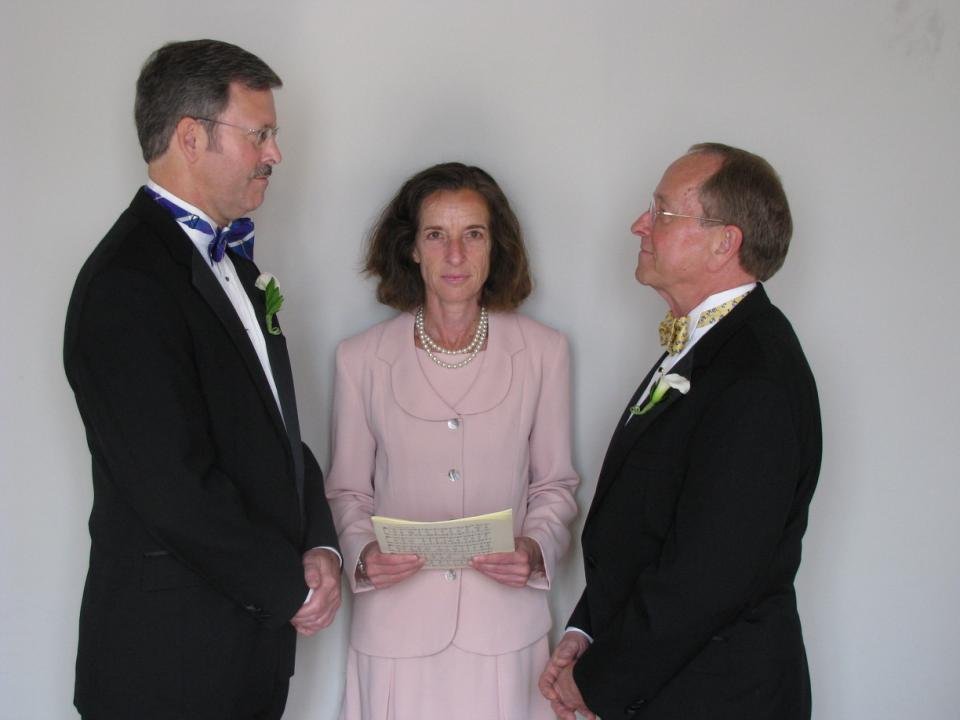
Predictably, when the Reverend
became a Bishop six years later, the Anglican community outside America
(and much of it within) were outraged, with Bishop Akinola of Nigeria
leading the backlash. Schism was threatened.
But as is generally the Anglican
way, the Church of England over time slowly learnt to bend with the wind
and accept what they deemed unavoidable. Thus it is that on 20
December, in the face of fierce opposition (again largely
led by Nigeria) it decided that gays in civil partnerships
CAN now be elevated to bishophood.
On one condition. That they
and their partners practice celibacy.
So what is a poor gay married CofE
bishop supposed to do?
 |
His bosses tell him no sex please, you're a
bishop, |
 |
while the state who sanctioned his civil
partnership makes clear that sex is an integral element of his
partnership. |
|
And pity the Inland Revenue
inspectors and Church Sextons (a propitious job title?) whose job is to police the gay-sex of
their respective constituents, ensuring that it is simultaneously taking
place and not, as the case may be. How they accomplish this vital
task on behalf of wider society I know not, but someone's got to make
sure the ridiculous rules are being upheld.
Nevertheless, it seems the only
chance for my non-gay buddy and me is for one of us to become an
Anglican bishop and then get
“married”,
or the other way round. Provided we
can dodge both the taxman and the sexton, we get the tax-breaks without
the boudoir, er, unpleasantnesses.
But with one-man-one-woman marriage
now obsolete and the old-fashioned constraints of the phrase rendered
meaningless, don't get me started on marriage between
Amy and her fairground ride ...


Back to List of Contents
|
Gaza
Ghetto - 6th
February 2013
No logic or reason
informs the arguments of Israel-haters and/or Jew-haters
(if indeed there is a difference)
This is a
cartoon from the Facebook
page,
“Israel
is a War Criminal” ,
to which I couldn't resist responding. ,
to which I couldn't resist responding.

“Yeah right”,
I wrote sarcastically.
“Those damn Jews kept lobbing so many
rockets at the poor innocent Nazis that they had no choice but to round
them up, ship them to concentration camps and gas them”.
Sanya Petrovic Fukerkov took the
bait:
“You think the Palestinian rocket fire is
the bigger problem than the Israeli system”
I answered her with actual data,
and since it took me a bit of time to collate them, I though it
worthwhile to store the results here on my Tallrite Blog so as to have
it on record.
I hate being boring with
facts, I told her, but eight thousand rockets fired from Gaza into
Israel is in fact a big
“problem”.
The moment the rockets stop, the Gaza blockade as some call it will
stop. It's that simple.
Here's the breakdown (with sources).
Rockets fired into Israel
|
2001: 7 |
2005: 401 |
2009: 569
|
|
2002: 42 |
2006: 1716 |
2010: 150
|
|
2003: 105 |
2007: 1271 |
2011: 386
|
|
2004: 159 |
2008: 1399 |
2012: 1814 |
|
Total 2001-2012:
8,019 |
And since when I see a collection of numbers I
cannot resist drawing a chart, here it is. A colourful
pictures speaks a lot louder than numbers.

My two sources were:
|
Eventually the discussion thread petered out when my
opponents tired of calling me names and inventing
“facts”.

Back to List of Contents
|
Fai Chun - Year of the Snake
- 6th February 2013
Hey, it's just a
snake

Professor
Lap-Chee Tsui is the Vice-Chancellor of Hong Kong University, my
first alma mater. He created this
Chinese calligraphy of Fai Chun as a greeting to family and
friends to commemorate the Year of the
Snake, which begins on 10th February 2013 and runs until 31st January 2014. So
please accept this greeting from me to you.
In case you want to create your own Fai Chun, it's easy.
Here's how.

Back to List of Contents
|
|
Anybody Here Seen Kerry?
- 6th February 2013
Unfortunately,
we're going to see rather too much of him for the next four years
Now that the Senate has endorsed
John Kerry as Secretary of State for the next four years, in what has to be one of the
Buffoon-in-Chief's worst thought-through senior cabinet appointments (in
a field of ferocious competition), it's time to recall the Democratic
Presidential convention of 2004. After Mr Kerry gave a typically
ponderous vainglorious speech preceded by a childish “reporting-for-duty”
moment, he was endorsed as presidential
candidate, to face (and lose to) George W Bush who was seeking
re-election.
During his campaign, he
constantly bragged
about his military record in Vietnam, but this was thoroughly debunked by his
own comrades in arms, the so-called Swiftboaters, who refused to
subscribe to his baloney.
So I couldn't help mocking him.
Have a
fifty-second listen.

Back to List of Contents
|
|
Horseburger
Groans - 6th
February 2013
Groan
“I've eaten one too many of those
equine burgers; I reckon I can't take another - I am horse de combat”.
If, following the
horse-in-burger-meat scandal, you are groaning from one too many
horseburger jokes, and would like to groan some more, I have collected
all the ones I could (easily) find. You can find them on
one of my
Light Relief pages.
Groan.

Back to List of Contents
|
|
Issue 222’s
Comments to Cyberspace
Period August 2012 to February 2013
 |
Cost of Corrib Protests
[P!]
Letter
published in the Irish Times
The report in your newspaper on the latest protests over Shell’s
development of the Corrib gas field that “the
cost of developing the Corrib gas field could be
four times the initial estimate of €800 million at
more than €3 billion”. Simultaneously, the
project timetable has trebled from four years
(delivery in 2007) to 12 (2015). These
overruns are due overwhelmingly to the protests
against a project that was and is proceeding in full
compliance ... | |
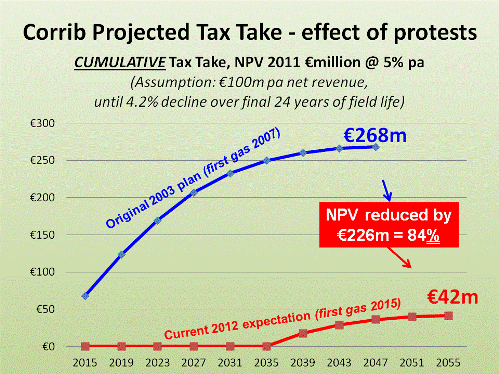
 |
Assorted Online Comments
- February 2013
Comment made a singe article
(so far) in the Irish Times |
 |
Assorted Online Comments
- January 2013
Comments made to nine articles
in the Irish Times and
a vitriolic thread in the left-wing
Cedar Lounge Revolution |
|
 |
Assorted Online Comments
- December 2012
Comments made to seven
articles, all in the Irish Times |
|
 |
Higgins's wings clipped in full debate
[P!]
Letter published in the Sunday Times on 11th November
In her hagiography of President Higgins, Alison O'Connor
describes her pleasure at hearing once more his
“slapdown”
of American radio host Michael Graham. However she should do her research before indulging
such glee ... |
|
 |
Children Rights Referendum
[P!]
Letter to the Irish Times (published)
AND to the Irish Independent
(unpublished)
Ireland's written constitution of 1937 is the third
oldest in the world, after America (1789) and Australia (1901). It has stood
the test of time like few others, through a world war, through a cold war,
through countless dictatorships ... |
|
 |
Assorted Online Comments
- November 2012
Comments made to four articles,
all in the Irish Times |
|
 |
Assorted Online Comments
- October 2012
Comments made to six articles,
all in the Irish Times |
|
 |
Ireland's freedom of speech
culture
Letter (unpublished) to the Irish Independent
Regarding those remonstrating outside the Google
headquarters and US Embassy about the availability of some pathetic Youtube
clip, is it not ironic that they should use Ireland's freedom
of speech culture to protest against Ireland's freedom of speech culture?
|
|
 |
Insult to Muhammad
Letter (unpublished) to the Irish Times
Richard Kimball thinks that
offensive speech should be restricted for fear of possible
“public unrest”. I find that a highly offensive contention and call on
him to retract it and apologise ... |
|
 |
Price of medicines
Letter (unpublished) to the Irish Times
The self-serving apologias in
respect of Ireland's exorbitant cost of medicines, as advanced by the Irish
Pharmaceutical Healthcare Association's Philip Hannon and by opthalmologist
Kate Coleman, would be amusing were they not so pathetic ... |
|
 |
Assorted Online Comments
- September 2012
Comments made to eleven
articles, all in the Irish Times |
|
 |
Assorted Online Comments
- August 2012
Comments made to seven articles,
all in the Irish Times |
|
 |
ESM
Treaty an invitation to corruption
Letter to the Irish Independent and to the Irish Times
The ESM Treaty, which when fully ratified will set up
a permanent €urozone bailout fund (out of non-existent money), is a
totalitarian abomination, which no patriot would ever sign his/her country
up to ... |

Back to List of Contents
|
Quote (19th March): “OK, so props don't ever join the referee ranks
because it's a lot of running. But would it be so harmful to perhaps get a
prop on the pitch to officiate at scrum-time only? He could then leave the
field until the next scrum. He wouldn't have to run anywhere, he'd get free
pies on the touchline, and we'd have a scrum official who'd really know what
was going on.”
A commentator's suggestion at the recent
Wales/England 6-Nations championship decider,
which was heavily punctuated by inscrutable penalties at scrum time.
The problem is that rugby referees are never props (who hate running)
and therefore never understand the mysterious, nefarious machinations
grinding within the dark recesses of a heaving, wheezing, sweat-laden scrum.
Hat-tip: Graham Hunt in Perth, Oz
Quote (19th March): “Sure what
could go wrong? It is the day after St Patrick’s Day, a roomful of Paddies,
a free bar and the future king of England. It’s going to be messy.”
Comedian Patrick Nulty at a €1,000-per-plate
testimonial dinner
in London for Irish rugby star Brian O'Driscoll,
attended by, inter alia, the Duke of Cambridge
Quote (19th Feb): “Ah
no, I'll let someone else eat him. I know him too well!”
Paddy Jack, in Dublin's
Temple Bar Farmers' Market,
where he serves horse steak sandwiches in Ireland's only horse meat outlet.
He his referring to Do
or Die, his pet racehorse
who is being trained to compete.
But if on the racecourse
Do or Die fails to Do the business he will Die
- and be served up on Mr Jack's stall.
Though for sentimental reasons not to Mr Jack himself.
Quote (12th Feb): “Nothing
I’m proposing tonight should increase our deficit by a single dime.”
President Obama explains in his 2013 State
of the Union address
that his proposed litany of more spending, new programs and new
bureaucracies
will not increase America's $16½ trillion deficit
“by a single dime”!
Yes, really!
Quote (7th Feb): “My concrete
question to the Irish presidency is: what are you doing to tackle the
problem of growing Christian persecution?”
Dutch
MEP Peter van Dalen, in response to the reported persecution of
a hundred 100 million Christians around the world,
demands that Ireland as current EU “president”,
take concrete action.
Ireland's response? Waffle, of course
Quote: “Statistics are like a bikini; it shows a lot but not
the whole thing.”
Scott Johnson, the Australian coach of
Scotland’s rugby union side,
before on 2nd February it lost (again) to England not just in points scored,
18-38,
but on almost every other statistic measured during the match,
as indeed in most matches for the past thirty years
Hattip: Graham Hunt
Quote: “For every hundred crimes
committed in Britain today just one criminal will end up with a conviction
in a court of law.”
Chris Huhne, Minister of Justice, in
2008
bemoaning the easy ride 99% of criminals get.
Chris Huhne in 2013 became part of the
unlucky one percent
when he was convicted and jailed
for perverting the course of justice over ...
a speeding ticket.
Quote:
“We don't have to pay England to be our friend, so why do we
have to pay Egypt?”
Senator Rand Paul objects to America
sending
F-16s and cash to Egypt under the rule of its
anti-Semitic, holocaust-denying, dictatorship-creating
president Mohammed Morsi
Quote (Facebook, Philip O'Sullivan):
“Despite spending six centuries
buried under a car park, he still has better teeth than most of the guests
on the ghastly
Jeremy Kyle show.”
The best comment so far With regard to
King Richard III

Back to List of Contents
|

 The Cypriots tell us that they have excellent
The Cypriots tell us that they have excellent

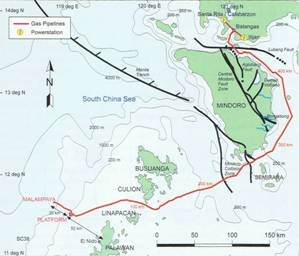
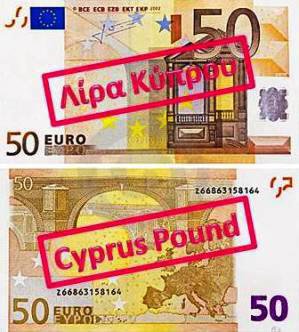 When perhaps a dozen wells have been
drilled
(at a typical cost of €40 million each), or perhaps even the four more
that the chart indicates are planned, it will be time to take seriously
claims of 7 TCF.
When perhaps a dozen wells have been
drilled
(at a typical cost of €40 million each), or perhaps even the four more
that the chart indicates are planned, it will be time to take seriously
claims of 7 TCF. 




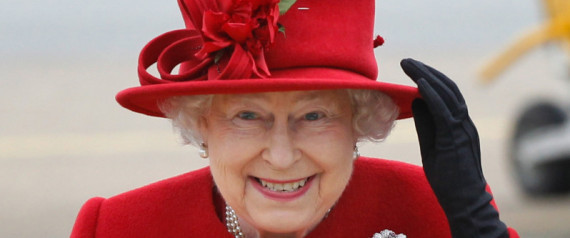




 That
is because fraccing is, simply, making available huge
quantities of hydrocarbons within the Western countries themselves,
changing the energy picture dramatically.
That
is because fraccing is, simply, making available huge
quantities of hydrocarbons within the Western countries themselves,
changing the energy picture dramatically. 




 ,
to which I couldn't resist responding.
,
to which I couldn't resist responding. 
















